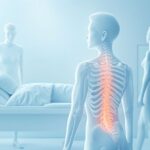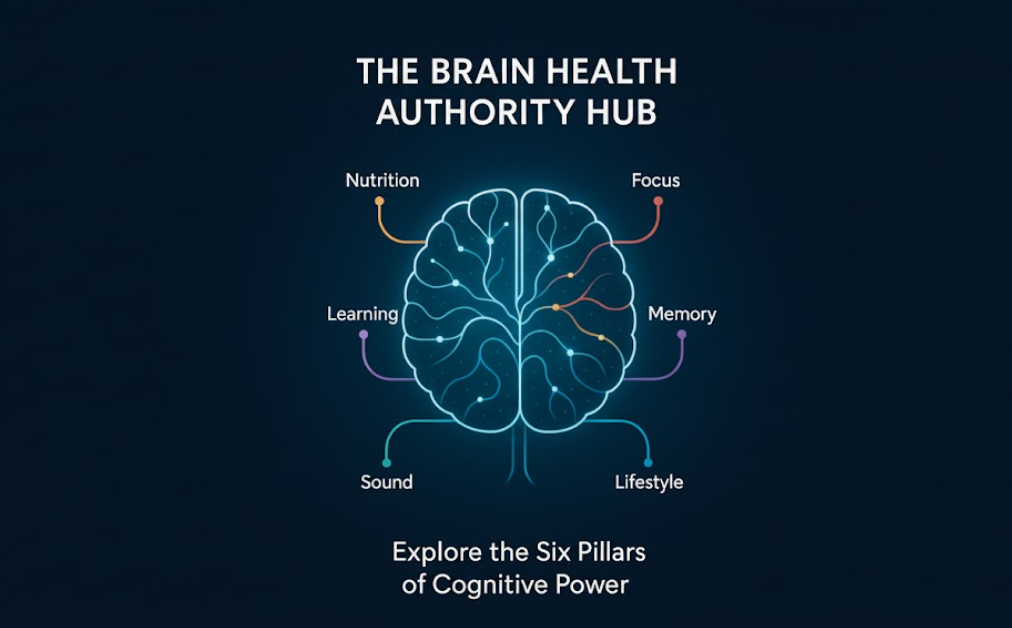🧩 Introduction
Your brain is your greatest asset — every thought, decision, and dream starts there.
Yet stress, poor sleep, and nutrient deficiencies can cloud its potential.
At The Health Knowledge Base, we bring together neuroscience, nutrition, and holistic health to help you protect, enhance, and even reprogram your brain for better focus, memory, and creativity.
Explore below — six in-depth guides that form the foundation of your Brain Health Authority Hub. Each one dives into a different dimension of brain optimization.
🧠 1. Optimal Brain Function: The Ultimate Guide to Brain Health
Learn how to fuel and protect your brain through balanced nutrition, supplements, and lifestyle strategies.
🧩 Explore practical ways to enhance memory, focus, and neuroprotection.
🔗 Read the Guide →
⚡ 2. Cognitive Function & Mental Performance: Rewire Your Mind for Clarity and Focus
Discover how to train your brain for sustained focus, mental stamina, and emotional control.
Learn the science of neuroplasticity, and how binaural beats and cognitive exercises enhance mental agility.
🔗 Read the Guide →
💾 3. Memory Mastery: Improve Recall and Prevent Memory Loss
Boost your memory naturally with proven nutrition, stress management, and brain training methods.
Uncover how sleep, neuroplasticity, and sound therapy strengthen recall at any age.
🔗 Read the Guide →
📘 4. The Science of Learning: How to Absorb, Retain, and Recall Information Faster
Learn the neuroscience behind learning — and how to train your brain to study smarter, not harder.
Explore focus methods, frequency-enhanced learning, and study techniques backed by science.
🔗 Read the Guide →
🔊 5. Brainwave Frequencies & Binaural Beats: Unlocking the Hidden Power of Sound
Sound can do more than relax you — it can reprogram your brain.
Discover how binaural beats align your brainwaves for creativity, focus, and better sleep.
🔗 Read the Guide →
🌿 6. The Lifestyle Blueprint for a Smarter, Healthier Brain
Your habits shape your brain’s future. Learn how daily nutrition, exercise, mindfulness, and sleep routines create long-term cognitive resilience.
🔗 Read the Guide →
💡 Explore by Focus Area
| Focus | Quick Links |
|---|---|
| 🧠 Brain Health | Foods for Brain Health • Vitamins for Brain Health |
| ⚡ Focus & Mental Performance | Improve Focus • Brain Exercises |
| 💾 Memory | How to Improve Memory • Stress & Memory Loss |
| 📘 Learning | Learn Faster • Study Techniques |
| 🔊 Brainwaves | How Binaural Beats Work • Theta Wave Benefits |
| 🌿 Lifestyle | Morning Habits • Sleep for Brain Recovery |
🎧 Top Recommended Tools & Programs
Optimize your brain naturally with these neuroscience-backed digital tools:
- 🎧 Genius Wave — Brainwave entrainment for focus and creativity
- 🎵 Brain Song — Audio therapy for memory and calm
- 💡 Wealth Signal — Sound frequency for abundance and motivation
(Affiliate partnerships with trusted wellness brands. Results vary by individual.)
🧬 Why This Hub Matters
This collection is built to help readers:
- Understand the science behind brain optimization
- Apply simple, daily strategies to improve performance
- Discover proven audio and supplement solutions to accelerate results
Everything here is educational and research-based, empowering you to take control of your mental health naturally.
❓ FAQs About Brain Health
1. Can the brain really improve with age?
Yes — the brain is far more adaptable than most people realize. Through neuroplasticity, your neurons can form new pathways even in later life. Activities such as learning new skills, practicing memory exercises, and listening to Theta or Alpha brainwave audios stimulate these connections.
🧩 Learn more: The Science of Neuroplasticity
2. Which nutrients or supplements actually enhance brain health?
Scientific studies highlight omega-3 fatty acids, B-vitamins (especially B6, B12, and folate), vitamin D, magnesium, and adaptogens such as Bacopa monnieri, Lion’s Mane mushroom, and Rhodiola rosea. These nutrients improve communication between neurons, reduce inflammation, and support energy metabolism in the brain.
🧠 Explore: Best Vitamins and Minerals for Brain Health
3. How long does it take to notice improvements from brain training?
Results depend on consistency. Simple daily routines — such as 15 minutes of focus exercises, memory recall games, or binaural beat sessions — can yield noticeable gains in 3–6 weeks. Full rewiring of neural networks (neurogenesis) often occurs over 90 days of sustained practice.
🎧 Try: Genius Wave Program
4. What’s the fastest way to sharpen focus naturally?
Focus improves when oxygen, hydration, and dopamine levels are optimized. Start with deep breathing (4-7-8 method), a glass of water, and short bursts of focused work followed by brief rest (Pomodoro). Listening to Alpha brainwave frequencies (10 Hz) can further heighten concentration.
⚡ See also: Improve Focus and Concentration
5. Do brainwave audios and binaural beats really help?
Yes — controlled studies show that binaural beats can synchronize hemispheric activity, leading to improved attention, creativity, relaxation, and sleep quality. The key is to listen with stereo headphones for 10–20 minutes while relaxed. Different frequencies target different outcomes:
- Alpha (8–13 Hz): Calm focus
- Theta (4–8 Hz): Creativity, memory
- Delta (0.5–4 Hz): Deep sleep
🔊 Explore: Brainwave Frequencies & Binaural Beats Guide
6. How does stress impact the brain?
Chronic stress elevates cortisol, which damages neurons in the hippocampus — the center for learning and memory. Over time, this leads to forgetfulness and fatigue. Counter it with mindfulness, exercise, and sound therapy that lowers cortisol levels (e.g., Theta Wave audios).
🌿 Read more: Managing Stress to Improve Focus and Memory
7. How important is sleep for cognitive performance?
During deep sleep, your brain activates the glymphatic system, which clears toxins and consolidates memories. Adults need 7–8 hours of quality rest. Listening to Delta binaural beats before bed or maintaining a consistent bedtime routine can enhance sleep efficiency.
😴 Related: Sleep Optimization for Brain Recovery
8. Can diet really influence mood and cognition?
Absolutely. Diets rich in whole foods, omega-3s, and antioxidants support neurotransmitter balance, while processed foods and sugar cause inflammation and brain fog. The Mediterranean diet and DASH diet are both proven to enhance cognitive resilience.
🥗 Discover: Best Diets for Long-Term Brain Health
9. How do exercise and movement affect the brain?
Physical activity increases blood flow, delivering oxygen and nutrients to the brain. It also triggers the release of BDNF (Brain-Derived Neurotrophic Factor), a protein essential for neurogenesis and memory. Even 20 minutes of brisk walking can boost attention and mood.
💪 Learn more: The Role of Exercise in Brain Health
10. What’s the single most powerful daily habit for long-term brain health?
Consistency. A combination of small, daily rituals — hydration, mindful breathing, 30 minutes of movement, nutrient-dense meals, and a short binaural beat session — compounds over time. These actions keep neurons flexible, balanced, and energized for decades.
🌟 Read next: The Lifestyle Blueprint for a Smarter, Healthier Brain








